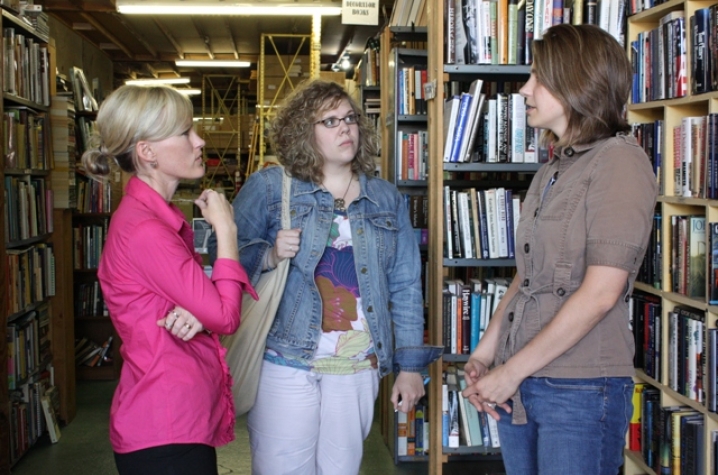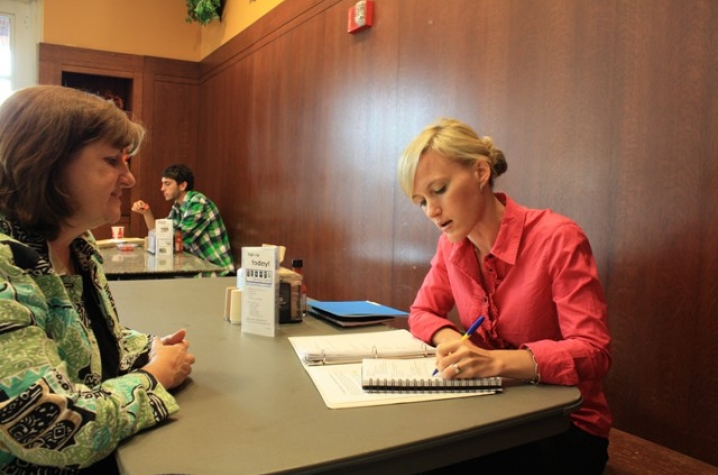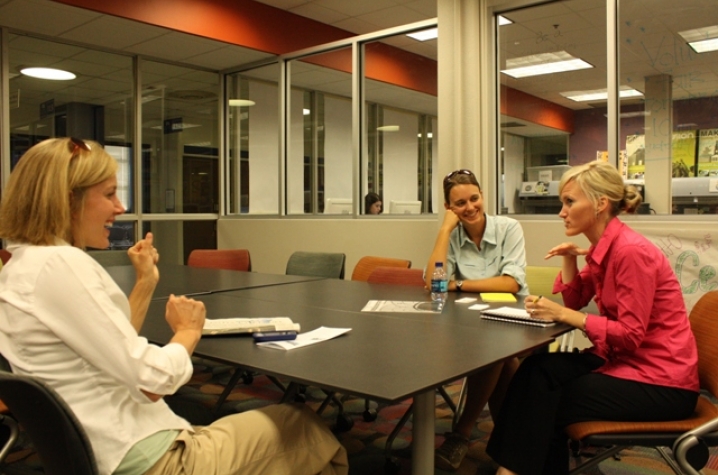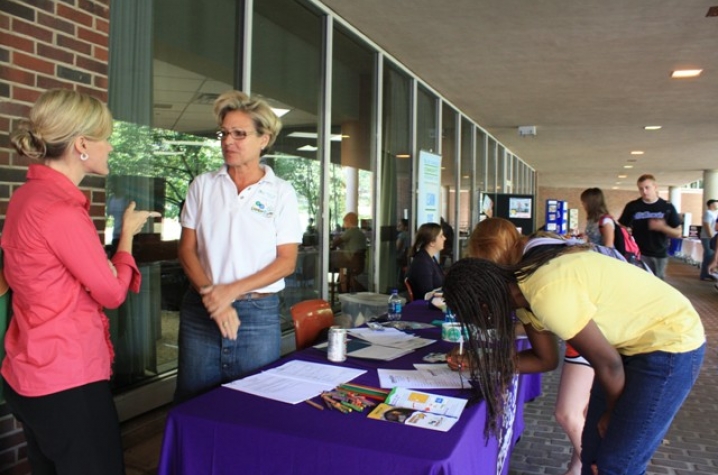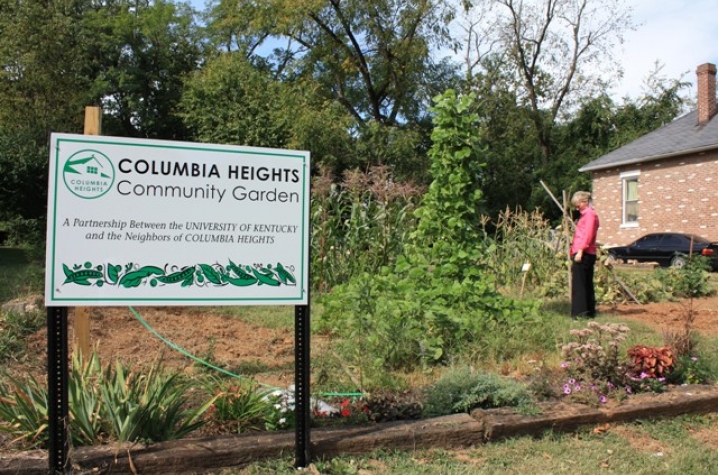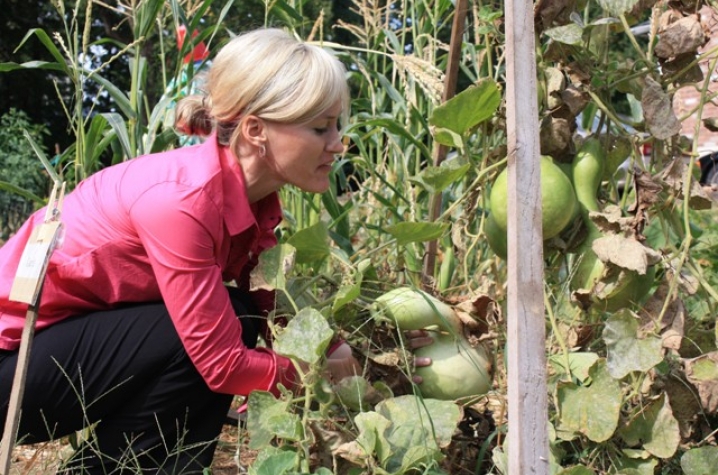The Matchmaker
LEXINGTON, Ky. (Nov. 16, 2010) — Laura Hatfield begins her day on a mission. The new director of community engagement in the University of Kentucky's Office of University Engagement spreads out her binder of notes at Ovid's Café in the William T. Young Library, reviewing the day's schedule. She'll spend the day matching up needs she’s previously discovered — student groups looking for volunteer opportunities; professors and staff with expertise and a desire to help; service-learning and community-based learning opportunities; departments looking to do outreach — with community needs.
"When we talk about engagement," Hatfield says, "we're not just talking about Lexington. We're talking about the state, the region and beyond. Engagement is a collaboration between the University and those external partners for a mutually beneficial exchange of knowledge and resources in a context of partnership and reciprocity."
Her first meeting gets things going. Susan West, director of Fraternity and Sorority Affairs in the UK Dean of Students Office, greets Hatfield as she sits down at the table.
Matching Students to the Community
Hatfield contacts West regularly to discuss service opportunities for fraternities and sororities. As a UK 101 teacher, West also taps Hatfield to help with the course's service- learning component. Recently, the two worked together on a project called Sleepless in Lexington. When asked to assist with this project, Hatfield asked West what types of experiences she wanted for her students. Hatfield had just visited the Lexington Rescue Mission, organizers of the Sleepless in Lexington event, and determined that an event like that may be just what they were looking for. It would not only give students an opportunity to raise money for a group in need, but would also allow them the hands-on experience in working with people different than themselves.
"They're raising money for a day center for the homeless," West explains. "They have places to go at night, but this would give them a place to go during the day."
Today, Hatfield wants to talk to West about several organizations that could use some student help. The first is called Sunflower Kids. The group puts together monitored visits with children of domestic violence and their families.
"I noticed Kappa Delta has a similar philanthropy," Hatfield says. West tells her how to get in touch with the philanthropy chair of each Greek organization. Hatfield scribbles notes, studies a page in her binder and tells West more.
Catholic Charities, she says, is in need of cleaning supplies. The Salvation Army never has enough potatoes and stuffing for its holiday baskets. This, she says, might make a good competition for the Greek chapters. West explains that a lot of the chapters sponsor one family during the holidays. Meanwhile, the Panhellenic Council - a governing body of 15 sororities on campus - has chosen domestic violence as its next outreach project. They're working with the Bluegrass Domestic Violence Program, West says, creating a farm where the women grow food for the shelter. Hatfield decides she will attend the next Council meeting, bringing someone from the community to do a short talk about their organization's needs - and hopefully spark some interest among the Greek chapters.
Hatfield adds more to her notes as West talks, keeping track of the service interests the various Greek organizations are focused on. Later she'll take this information on her site visits - when she goes out into the community to meet with charities, non-profit organizations and government agencies. Some community groups may need students for just a few hours during a one-time project. Others are looking for a longer-term commitment. Whatever their needs, Hatfield wants to have a student, a group or a class in mind to meet them.
"I feel like I'm the matchmaker," she says with a smile, beginning to sing an old song: "Matchmaker, matchmaker, make me a match ...."
A Life of Service
Hatfield's passion for service began early, leading her to major in family studies at UK's School of Human Environmental Sciences. But it wasn't until an experience abroad during her senior year that she understood her career calling.
"After graduating, I didn't know what I wanted to do," she remembers. "It's like, how do I serve for a living? How can I best help communities?"
She went to Minsk, Belarus on a mission trip for two and a half months, where she had what she describes as one of the most poignant moments in her life. She was handing out candy to children in an orphanage who had absolutely nothing. They had never seen candy before, only heard about it. Hatfield was thrilled to be giving them such a sweet treat. Once all the candy had been passed out, the children formed another line. Hatfield remembers saying to her friend, “We don’t have any more candy left. What are we going to do?” But to her surprise, the children began sharing their candy with Hatfield and all her friends. “I received more than candy that day," Hatfield remembers. "I received a lesson about the true meaning of giving taught by the real ‘experts.’”
While on the trip, she spent time talking with and listening to babushkas - elderly women in Belarus - and ended up spending the next eight years back home in Kentucky working with the elderly. "I still feel like I work in a nonprofit setting," she says of her new position. "Just going out into the community and finding a need. It’s wonderful to be able to pair that need with students who will apply the knowledge they learn in the classroom to the community and see that they are continuing to learn from those experiences. True engagement."
In her work with UK, she wants to help students find the same life-changing experiences she had. "In school, what really gave me life was interactions like this," she says. She wants to create a campus-wide database that brings together community needs, so students, faculty and staff can see the opportunities and existing resources in one place.
During her years working with the elderly, she continued to meet life-changing individuals like she had in Belarus. She remembers Nelle Johnson, a woman who lived at Ashland Terrace, the senior living home where Hatfield worked. Hatfield had commented that with a job in the nonprofit sector, and her husband working as a teacher, the two of them weren't going to make much money. Johnson, a retired teacher herself, described times when a former student would call her to say she had made a difference in their life. Such experiences, Johnson said, were her real paydays.
"She told me," Hatfield remembers, "'You and your husband will get paydays for the rest of your lives. Just wait and see.'"
Finding the Need
Hatfield's next stop is the annual volunteer fair on campus, sponsored by the UK Center for Community Outreach. The event brings organizations from the community to the Student Center, where they set up tables and meet with students, faculty and staff to discuss volunteer opportunities and community needs.
"Let's just take a gander and see who's here," she says, walking into the crowded fair. Suddenly, Hatfield becomes a superstar. Everyone at the fair seems to know her. She gets a hug from Anne Redmon of the Center for Creative Living, an adult day health care program.
"The students did so much outside, they made our garden look so good," Redmon tells Hatfield about a recent group of UK students who volunteered at the Center. "I would love to have a lot more students. Any you find, please send them my way."
Hatfield moves from table to table, checking up on organizations like Seedleaf, where executive director Ryan Koch is telling students about his group's work in raising food for people in need. "We're putting in gardens, trying to feed people," he says. "We've got some cooking classes, too."
"This is one of the best groups in town," Hatfield tells a group of students as they pass the Seedleaf table. Koch introduces himself as the students approach.
Hatfield stops at the Sunflower Kids table to tell them about her meeting with West. She invites them to come to the next meeting of the Panhellenic Council to give a "community commercial" about what Sunflower Kids does, and how UK students can help.
Hatfield meets with the Lexington Children's Theatre and Amachi, a mentoring program for kids with incarcerated parents. She checks in with the Martin Luther King Jr. Cultural Center, where she has helped to match up tutors at UK with at-risk kids. UK students make their way through the fair, stopping to get information on the organizations that interest them.
"This is my favorite day of the year," Hatfield says of the volunteer fair. "I just get such a huge rush - a payday."
Visiting the Community
Hatfield picks up Sarah Hermsmeier at the volunteer fair, and gets ready to make her afternoon site visits. Hermsmeier is an advisor for the Center for Community Outreach and will accompany Hatfield to visit Esther Hurlburt, a Lexington woman who bought two houses to transform into a safe home for five elderly low-income women - the Legacy Home non-profit. Hatfield helped to establish a partnership between the home and the UK Department of Landscape Architecture, where professors Laurie Fields and Ryan Hargrove and their students plan to help with renovation, building and beautification projects for the home. Hermsmeier is coming along to see how other UK student volunteers might be able to help.
Hatfield pulls her car up to the Delaware Avenue houses, parking behind Hurlburt's car, which displays a bumper sticker reading "Well-behaved women rarely make history." Hurlburt greets Hatfield and Hermsmeier, and the tour begins. The two houses, thanks to community volunteers, have been completely gutted.
"We're basically putting a new house in an old shell," Hurlburt says as the three enter the first house. "All of this is sweat equity. Money, fundraising and building supplies right now are our most immediate needs."
Hurlburt shows Hatfield and Hermsmeier the blueprints for the finished project. The two houses will be connected by a sun room, with a large deck out back. The house will provide an alternative for women who don't need a nursing home, but who could benefit from living together. Each woman will have her own bedroom, and the rent will be set affordably.
"The women who are going to come here will have been working women," Hurlburt explains, "but they're trying to live on Social Security."
Hatfield discusses fund-raising opportunities and volunteer needs with Hurlburt, and then leaves with Hermsmeier to make another site visit. The two drop in on Rachel Lewis, UK Patterson School of Diplomacy graduate and executive director of the International Book Project. The program sends books overseas to schools in need. Hatfield wants to find out if there are opportunities for UK students to volunteer, perform an internship or partner with the exchange for a service-learning class. Hatfield ends her day with a meeting back at UK with Jodie Koch and Crystal Bruno of the East Seventh Street Community Center.
A day of community engagement isn't easy. It involves a lot of pavement and people, putting together pieces of a puzzle that brings UK out of the campus and into the community. Hatfield will spend tomorrow following up on the contacts she made today, starting new relationships with UK groups and local organizations in need. Day in and day out, this matchmaker's work means valuable experience for UK students and much needed support for the community.





